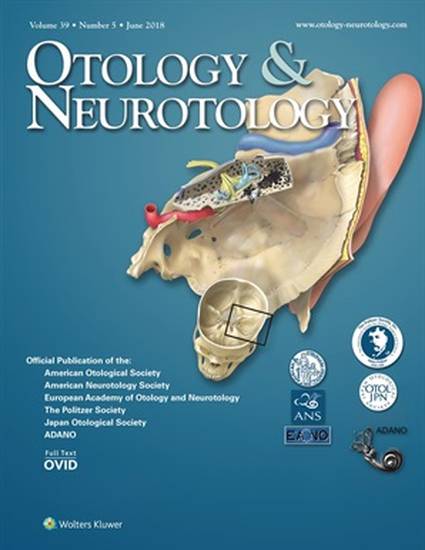
Article
Cochlear Implantation in Adults With Asymmetric Hearing Loss: Speech Recognition in Quiet and in Noise, and Health Related Quality of Life
Otology & Neurotology
(2018)
Abstract
Objective: To examine the possible speech recognition and health related quality of life (HRQoL) benefits of cochlear implantation among adults with asymmetric sensorineural hearing loss.
Study Design: Retrospective chart review, single-subject design.
Methods: A total of 45 adult cochlear implant recipients with asymmetric sensorineural hearing loss where performance for the best-aided condition exceeded 60% correct open set sentence recognition in quiet, and the implanted ear met traditional candidacy criteria. End point testing of the implanted ear was evaluated with use of the Consonant-Vowel Nucleus-Consonant (CNC) word test and AzBio sentence test materials in quiet, and bimodally with the AzBio sentence test materials in noise at +5 dB signal-to-noise ratio (SNR). HRQoL was measured using the Nijmegen Cochlear Implant Questionnaire (NCIQ).
Results: Measured in quiet, with the non-implanted ear plugged, the average CNC word scores increased from 9.1% preoperatively to 55.7% (p < 0.01) at the 6-month post-activation test interval. Similarly, average AzBio sentence scores in quiet, with the non-implanted ear plugged, increased from 13.9% preoperatively to 73.4% (p < 0.01) at the 6-month post-activation test interval. Finally, in the bilateral/bimodal condition, the AzBio sentence score in +5 dB SNR improved from an average of 26.8% preoperatively to 52.4% (p < 0.01) at the 6-month test interval. Results of the NCIQ showed improved scores on all six subdomains.
Conclusions: These data demonstrate significant benefit of cochlear implantation among a group of postlingually deafened adults whose preoperative hearing and aided speech recognition fell outside of the currently specified Food and Drug Administration candidacy guidelines. Results of this study support the evaluation of a candidate's speech recognition in noise in the best-aided condition to adequately assess candidacy for a cochlear implant.
Keywords
- Asymmetric hearing loss,
- Cochlear implantation,
- Speech recognition
Disciplines
Publication Date
June 1, 2018
DOI
10.1097/mao.0000000000001763
Publisher Statement
Copyright 2019 Otology & Neurotology, Inc.
Citation Information
Sladen, D.P., Carlson, M.L., Dowling, B.P., Olund, A. P., DeJong, M.D., Breneman, A., Hollander, S., Beatty, C.W., Neff, B.A., Driscoll, C.D. (2018). Cochlear implantation in adults with asymmetric hearing loss: speech recognition in quiet and in noise, and health related quality of life. Otology and Neurotology, 39(5):576-581. doi: 10.1097/MAO.0000000000001763.
